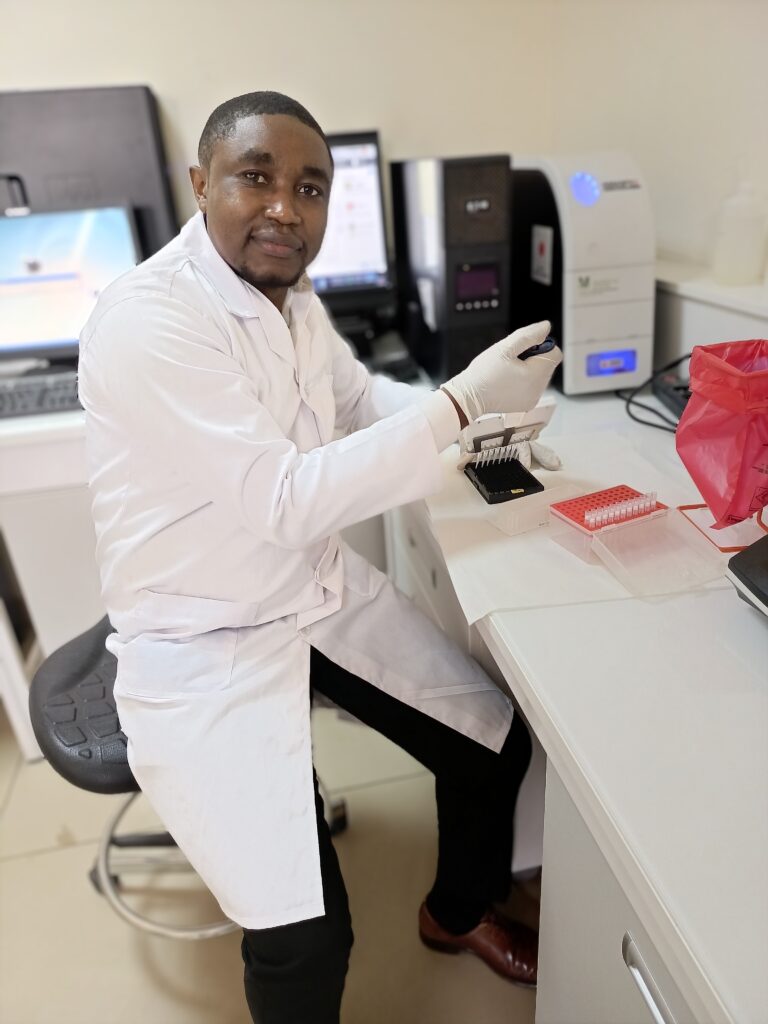Interview with Dr. Paul Alain Tagnouokam Ngoupo, Research Scientist, Head of the Immunology Platform, Centre Pasteur du Cameroun
January 2025

Dr. Tagnouokam Ngoupo, tell us about your background. How did you come to be an immunologist at the Centre Pasteur du Cameroun?
I completed my PhD studies in Molecular and cellular aspects of Biology in 2017 at The University of Rouen in France. Upon completing my PhD, I was recruited as Research Scientist at Centre Pasteur of Cameroon (CPC) where I currently carry out research on infectious diseases. Around 2016-2017, it became essential and mandatory to further research at CPC with the immunology component and the Immunology platform was initiated. Later in 2019, I took the lead of the platform with the long-term goal to acquire up-to-date equipment to develop cutting-edge research onsite.
Who are your mentors? Which scientists have inspired you on this journey?
I had the chance to have excellent mentors who have been very supportive for my career development including: Dr Anfumbom KFUTWAH who was my PhD Supervisor at CPC, Pr Jean-Christophe Plantier from the University of Rouen, Pr Richard Njouom who is the current head of the Virology Unit at CPC, Pr Sara Eyangoh the Scientific Director at CPC, Dr Ngu Abanda and Dr Serge Sadeuh who have been very inspiring. There are also other people who have been very helpful and supportive for me even though their names are not listed.
Tell us about your role in the PICREID project, and how it fits in with the mission of the CPC.
I am the Principal investigator of the PICREID project at Centre Pasteur du Cameroon. Therefore I am responsible for managing and coordinating all aspects of the research project in Cameroon. This includes but is not limited to staff management, experimental design, field work, laboratory and data analysis, communications and publications. I also participate in regular meetings and maintain permanent discussions with the PICREID management team to take appropriate and strategic decisions about the implementation of the work.
CPC is a public administrative institution of the Ministry of Public Health of Cameroon. It is nationally and internationally recognized through is assignment as national or sub-regional reference laboratory for more than 22 epidemic-prone infectious diseases including Arboviruses (Dengue, Yellow fever, Chikungunya) and Viral Hemorrhagic Fevers (Rift Valley, Crimean-Congo, Lassa, Ebola and Marburg). As the national reference and public health laboratory in Cameroon, CPC plays a key role in the virological surveillance of diseases and outbreak response. As such, PICREID project perfectly aligns with CPC missions and has helped to build sustainable multilateral research partnerships on emerging infectious diseases with some African institutions with comparable emerging threats and the Pasteur Network. These partnerships include capacity strengthening in research and public health in order to respond efficiently to potential outbreaks and mitigate the impacts of epidemics in Cameroon and central Africa. The participation of CPC in this project also aligns with the NIH objective to enhance public health related research and diseases control where it is most needed.
What are some of the challenges to conducting scientific research in Cameroon?
Cameroon, like other LMIC countries, faces some challenges on conducting scientific research including but not limited to lack of funding and specific platforms (genomics, cytometry, bioinformatics etc….). Even though the genomic platfoms in the country have been upgraded with the COVID pandemic, many efforts are still needed to build a competitive research ecosystem in Cameroon.
What are some of the advantages and strengths inherent to your country?
Despite the challenges, Cameroon remains a country with favorable conditions for scientific research. Among these we can have human resources with good background, good collaborators to implement work in the field, good policies in place which favor scientific research.
If you had unlimited means, what are some resources that would make the biggest contributions to advancing research in Cameroon (people, equipment, infrastructure….)?
Advancing research in Cameroon requires interventions in different sectors:
(i) Human resources (training of more people including students in scientific research)
(ii) Equipment (specific equipments for omics, immunology, epidemiology, etc. to carry-out cutting-edge research)
(iii) Infrastructure (more research laboratories including high containment Lab should be built in the country to overcome the high demand
(iv) Community and stakeholder’s engagement (platform of discussion and communication between scientists and the community at different level will greatly enhance the impact of research)
How has the PICREID project contributed to your career? What will the next steps be for you after the project is finished?
Participating to the PICREID project has been an important step to my career. This is my biggest grant I have obtained and managed and I am now more familiar with NIH funding. I had the opportunity to interact with stakeholders locally and internationally and this has increased my visibility as a researcher. Collaborating with outstanding scientists in the consortium is certainly a big stepping stone to enhancing my research capabilities to take more senior roles in future research projects.
After the PICREID project I would particularly like to have access to more grants to carry out higher level scientific research with immunology and genomic components to further work initiated in the project. I will be able to develop comprehensive and innovative strategies to control and respond to future epidemics. I would also like to train the younger generation of scientists who will contribute to tackle disease burden in Cameroon and in Africa.
What do you enjoy doing when you are not at work?
Outside of work, I enjoy spending time with my family because it is the most important for me. I also like watching football (my favorite team is Real Madrid) and I play when I have the opportunity to do so. I also enjoy reading books on personal development, emotional intelligence, etc.


